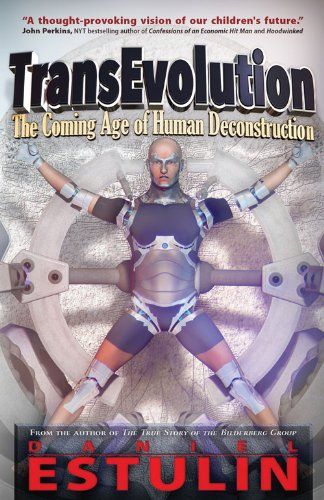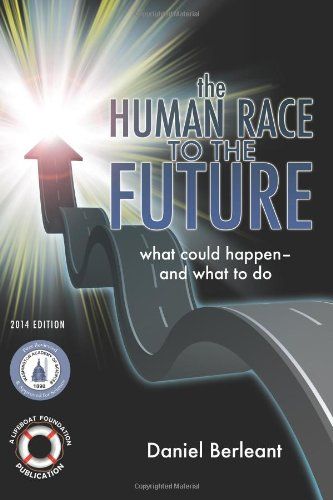.#democracy. #you. #indie. #webcontent. #contentmarketing. @HJBentham.

.#democracy. #you. #indie. #webcontent. #contentmarketing. @HJBentham.

. @hjbentham . @clubofinfo . @dissidentvoice_ .#tech .#gmo .#ethics . @ieet .


- @ClubOfINFO — TransEvolution: The Coming Age of Human Deconstruction (2014) is an alarmist book by Daniel Estulin, a commentator on the secretive Bilderberg Group who is well-liked by many – in particular on conspiracy theorist forums. Essentially, this should be regarded as conspiracy theory material. My refutations of it are too many to cram into this review, so I will mainly focus on what the book itself says.
“Many people have trouble understanding what the true transhumanism movement is about, and why it’s so evil. After all, it’s just about improving our quality of life, right? Or is transhumanism about social control on a gigantic scale?” (p. 172–173)
“Transhumanism fills people’s hopes and minds with dreams of becoming superhuman, but the fact of the matter is that the true goal is the removal of that pesky, human free will itself.” (p. 186)
By Harry J. Bentham — More articles by Harry J. Bentham
Originally published on 20 May 2014 at h+ Magazine

By Harry J. Bentham — More articles by Harry J. Bentham
Originally published on 22 May 2014 at Dissident Voice

- @ClubOfINFO — A recent massive leap forward in synthetic life, recently published in Nature, is the expansion of the alphabet of DNA to six letters rather than four, by synthetic biologists – the technicians to whom we entrust the great task of reprogramming life itself.
“Creating life at the speed of light is part of a new industrial revolution that will see manufacturing shift away from the centralized factories of the past to a distributed, domestic manufacturing future, thanks to 3-d printers.”
By Harry J. Bentham — More articles by Harry J. Bentham
Originally published on 13 May 2014 at the Institute for Ethics and Emerging Technologies (IEET)

| Visit ClubOfINFO |
- @ClubOfINFO — Rather than location, education or privilege, having something to offer seems to now be the only determining factor for a writer or activist to be published and gain a voice internationally.
For people who believe they have something decisive to offer to futurist discussions about where technology is carrying society and the state, there is no reason to defer to academics and self-proclaimed experts. Everyone’s interests should be taken into consideration, and all should take part in what should be the most democratic explosion in history.
From CLUBOF.INFO
#YEStoIndependence? According to much of the negative commentary in the Scottish independence debate, scientific research in Scotland will be negatively affected by independence. However, Scottish contributions to science will in the long term receive more recognition if Scotland is an independent state.
Image credit: Clydespace

From CLUBOF.INFO
All religions have points of agreement concerning human toil and its relationship to the divine. This essay considers some of the Biblical and Hellenic parables of human origin, specifically the origins of human knowledge and instrumentality.
Here I want to present how knowledge and instrumentality are reported to originate with an act of mischief, specifically the theft of a divine artifact. My argument is that, although the possession of knowledge may be seen as a sin to be atoned for, the kind of atonement originally promoted may have simply been for us to apply our knowledge constructively in our lives. The concept of atoning for original sin (whether it is the Biblical or Hellenic sin) can then be justified with secular arguments. Everyone can agree that we retain the capacity for knowledge, and this means our atonement for the reported theft of such knowledge would simply rest with the use of the very same tool we reportedly stole.
The story of the titan Prometheus, from ancient Greek mythology, has been interpreted and reinterpreted many times. A great deal of writers and organizations have laid claim to the symbolism of Prometheus, including in modern times. [1] I would argue that too many writers diluted and over-explored the meaning of the parable by comparing everything to it, although this is not the focus of my essay. Greek mythology is notably weak on the subject of “good and evil” because it predates the Judeo-Christian propagation of their dualism, and this means most of the characters in Greek mythology can be defended or condemned without violating Hellenic theology. Prometheus as a mythic figure could be condemned from a Christian standpoint, because he seems strikingly similar to other scriptural characters engaged in a revolt against the divine. Yet the spirit of Prometheus and his theft has also been endorsed by people and organizations, such as the transhumanists who see him as an expression of the noblest human aspirations. [2]
The widely repeated version of the Prometheus story holds that Prometheus was a titan, a primordial deity who literally stole a sample of fire from Olympus and handed it down to humans. Prometheus was subsequently punished by the gods, who nailed him to a mountain and trapped him in a time-loop so that an eagle repeatedly ate his liver before it was regenerated to be eaten yet again. However, contrary to popular belief, the Prometheus parable is not mainly about the theft of fire but about the creation of the first man. According to Apollodorus’ Library dating from the First or Second Century AD:
“After he had fashioned men from water and earth, Prometheus also gave them fire, which he had hidden in a fennel stalk in secret from Zeus. But when Zeus learned of it, he ordered Hephiastos to nail his body to Mount Caucasos (a mountain that lies in Scythia). So Prometheus was nailed to it and held fast there for a good many years; and each day, an eagle swooped down to feed on the lobes of his liver, which grew again by night. Such was the punishment suffered by Prometheus for having stolen the fire, until Heracles later released him, as we shall show in our account of Heracles.” [3]
Immediately, you may be eager to identify the differences between this account of humanity’s creation and the Abrahamic accounts. For example, man is created by the thief, Zeus punishes the thief rather than man (it may seem), and the punishment of the thief is not portrayed as good, because ultimately the hero Heracles is destined to set Prometheus free again. However, the similarities are striking. Mankind is believed, in this parable, to be a source of trouble for the gods because mankind’s unique power derives from the violation and theft of divine power. We also encounter the apparent responsibility of women for the release of evil, found in the parable of Pandora, noted in the Library as being described by Hesiod as a “beautiful evil.” [4] Pandora (meaning women) was inflicted on men as the punishment for their possession of fire, which directly connects the tale of Pandora with the tale of Prometheus. We may speculate that Hesiod’s Pandora story contributed misogyny in the way some have argued that the Genesis account justifies misogyny. [5] However, such misogyny would defy the notion that Pandora, unlike men, was created by the gods [6] and was not punished by them…
The whole article has been reprinted at CLUBOF.INFO

From CLUBOF.INFO
The Human Race to the Future (2014 Edition) is the scientific Lifeboat Foundation think tank’s publication first made available in 2013, covering a number of dilemmas fundamental to the human future and of great interest to all readers. Daniel Berleant’s approach to popularizing science is more entertaining than a lot of other science writers, and this book contains many surprises and useful knowledge.
Some of the science covered in The Human Race to the Future, such as future ice ages and predictions of where natural evolution will take us next, is not immediately relevant in our lives and politics, but it is still presented to make fascinating reading. The rest of the science in the book is very linked to society’s immediate future, and deserves great consideration by commentators, activists and policymakers because it is only going to get more important as the world moves forward.
The book makes many warnings and calls for caution, but also makes an optimistic forecast about how society might look in the future. For example, It is “economically possible” to have a society where all the basics are free and all work is essentially optional (a way for people to turn their hobbies into a way of earning more possessions) (p. 6–7).
A transhumanist possibility of interest in The Human Race to the Future is the change in how people communicate, including closing the gap between thought and action to create instruments (maybe even mechanical bodies) that respond to thought alone. The world may be projected to move away from keyboards and touchscreens towards mind-reading interfaces (p. 13–18). This would be necessary for people suffering from physical disabilities, and for soldiers in the arms race to improve response times in lethal situations.
To critique the above point made in the book, it is likely that drone operators and power-armor wearers in future armies would be very keen to link their brains directly to their hardware, and the emerging mind-reading technology would make it possible. However, there is reason to doubt the possibility of effective teamwork while relying on such interfaces. Verbal or visual interfaces are actually more attuned to people as a social animal, letting us hear or see our colleagues’ thoughts and review their actions as they happen, which allows for better teamwork. A soldier, for example, may be happy with his own improved reaction times when controlling equipment directly with his brain, but his fellow soldiers and officers may only be irritated by the lack of an intermediate phase to see his intent and rescind his actions before he completes them. Some helicopter and vehicle accidents are averted only by one crewman seeing another’s error, and correcting him in time. If vehicles were controlled by mind-reading, these errors would increasingly start to become fatal.
Reading and research is also an area that could develop in a radical new direction unlike anything before in the history of communication. The Human Race to the Future speculates that beyond articles as they exist now (e.g. Wikipedia articles) there could be custom-generated articles specific to the user’s research goal or browsing. One’s own query could shape the layout and content of each article, as it is generated. This way, reams of irrelevant information will not need to be waded through to answer a very specific query (p. 19–24).
Greatly similar to the same view I have written works expressing, the book sees industrial civilization as being burdened above all by too much centralization, e.g. oil refineries. This endangers civilization, and threatens collapse if something should later go wrong (p. 32, 33). For example, an electromagnetic pulse (EMP) resulting from a solar storm could cause serious damage as a result of the centralization of electrical infrastructure. Digital sabotage could also threaten such infrastructure (p. 34, 35).
The solution to this problem is decentralization, as “where centralization creates vulnerability, decentralization alleviates it” (p. 37). Solar cells are one example of decentralized power production (p. 37–40), but there is also much promise in home fuel production using such things as ethanol and biogas (p. 40–42). Beyond fuel, there is also much benefit that could come from decentralized, highly localized food production, even “labor-free”, and “using robots” (p. 42–45). These possibilities deserve maximum attention for the sake of world welfare, considering the increasing UN concerns about getting adequate food and energy supplies to the growing global population. There should not need to be a food vs. fuel debate, as the only acceptable solution can be to engineer solutions to both problems. An additional option for increasing food production is artificial meat, which should aim to replace the reliance on livestock. Reliance on livestock has an “intrinsic wastefulness” that artificial meat does not have, so it makes sense for artificial meat to become the cheapest option in the long run (p. 62–65). Perhaps stranger and more profound is the option of genetically enhancing humans to make better use of food and other resources (p. 271–274).
On a related topic, sequencing our own genome may be able to have “major impacts, from medicine to self-knowledge” (p. 46–51). However, the book does not contain mention of synthetic biology and the potential impacts of J. Craig Venter’s work, as explained in such works as Life at the Speed of Light. This could certainly be something worth adding to the story, if future editions of the book aim to include some additional detail.
At least related to synthetic biology is the book’s discussion of genetic engineering of plants to produce healthier or more abundant food. Alternatively, plants could be genetically programmed to extract metal compounds from the soil (p. 213–215). However, we must be aware that this could similarly lead to threats, such as “superweeds that overrun the world” similar to the flora in John Wyndam’s Day of the Triffids (p. 197–219). Synthetic biology products could also accidentally expose civilization to microorganisms with unknown consequences, perhaps even as dangerous as alien contagions depicted in fiction. On the other hand, they could lead to potentially unlimited resources, with strange vats of bacteria capable of manufacturing oil from simple chemical feedstocks. Indeed, “genetic engineering could be used to create organic prairies that are useful to humans” (p. 265), literally redesigning and upgrading our own environment to give us more resources.
The book advocates that politics should focus on long-term thinking, e.g. to deal with global warming, and should involve “synergistic cooperation” rather than “narrow national self-interest” (p. 66–75). This is a very important point, and may coincide with the complex prediction that nation states in their present form are flawed and too slow-moving. Nation-states may be increasingly incapable of meeting the challenges of an interconnected world in which national narratives produce less and less legitimate security thinking and transnational identities become more important.
Close to issues of security, The Human Race to the Future considers nuclear proliferation, and sees that the reasons for nuclear proliferation need to be investigated in more depth for the sake of simply by reducing incentives. To avoid further research, due to thinking that it has already been sufficiently completed, is “downright dangerous” (p. 89–94). Such a call is certainly necessary at a time when there is still hostility against developing countries with nuclear programs, and this hostility is simply inflammatory and making the world more dangerous. To a large extent, nuclear proliferation is inevitable in a world where countries are permitted to bomb one another because of little more than suspicions and fears.
Another area covered in this book that is worth celebrating is the AI singularity, which is described here as meaning the point at which a computer is sophisticated enough to design a more powerful computer than itself. While it could mean unlimited engineering and innovation without the need for human imagination, there are also great risks. For example, a “corporbot” or “robosoldier,” determined to promote the interests of an organization or defeat enemies, respectively. These, as repeatedly warned through science fiction, could become runaway entities that no longer listen to human orders (p. 83–88, 122–127).
A more distant possibility explored in Berleant’s book is the colonization of other planets in the solar system (p. 97–121, 169–174). There is the well-taken point that technological pioneers should already be trying to settle remote and inhospitable locations on Earth, to perfect the technology and society of self-sustaining settlements (Antarctica?) (p.106). Disaster scenarios considered in the book that may necessitate us moving off-world in the long term include a hydrogen sulfide poisoning apocalypse (p. 142–146) and a giant asteroid impact (p. 231–236)
The Human Race to the Future is a realistic and practical guide to the dilemmas fundamental to the human future. Of particular interest to general readers, policymakers and activists should be the issues that concern the near future, such as genetic engineering aimed at conservation of resources and the achievement of abundance.